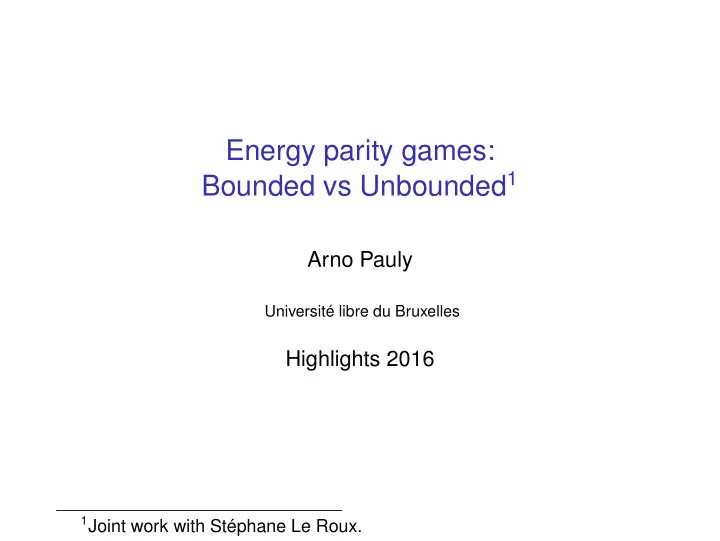

Energy parity games: Bounded vs Unbounded 1 Arno Pauly Université libre du Bruxelles Highlights 2016 1 Joint work with Stéphane Le Roux.
An example v 0 a c b e d Vertex Parity Energy- δ a 0 + 5 b 3 − 2 − 1 c 2 ... ... ...
Goal Unbounded case: Player I wants to ensure that both : ◮ ∀ t � t i = 0 δ i ≥ 0 ◮ The least priority visited infinitely often is even. Bounded case: (with bound B ∈ N ) Player I wants to ensure that both : ◮ ∀ tE t ≥ 0, where E 0 = 0, E t + 1 = min { B , E t + δ t } . ◮ The least priority visited infinitely often is even.
Goal Unbounded case: Player I wants to ensure that both : ◮ ∀ t � t i = 0 δ i ≥ 0 ◮ The least priority visited infinitely often is even. Bounded case: (with bound B ∈ N ) Player I wants to ensure that both : ◮ ∀ tE t ≥ 0, where E 0 = 0, E t + 1 = min { B , E t + δ t } . ◮ The least priority visited infinitely often is even.
Finite memory determinacy K.Chatterjee & L.Doyen. Energy Parity Games. Theoretical Computer Science 2012. n := number of vertices, W := max | δ i | , d := number of parities Theorem Unbounded energy parity games are finite memory determined, and 4 dWn memory states suffice.
Finite memory determinacy K.Chatterjee & L.Doyen. Energy Parity Games. Theoretical Computer Science 2012. n := number of vertices, W := max | δ i | , d := number of parities Theorem Unbounded energy parity games are finite memory determined, and 4 dWn memory states suffice.
Finite memory determinacy K.Chatterjee & L.Doyen. Energy Parity Games. Theoretical Computer Science 2012. n := number of vertices, W := max | δ i | , d := number of parities Theorem Unbounded energy parity games are finite memory determined, and 4 dWn memory states suffice.
Lower bound start 1/+1 1/-W 1/-W 0/-W Proposition (Chatterjee and Doyen, Energy Parity Games, 2012) 2 W ( n − 1 ) memory states are required.
Lower bound start 1/+1 1/-W 1/-W 0/-W Proposition (Chatterjee and Doyen, Energy Parity Games, 2012) 2 W ( n − 1 ) memory states are required.
Why bounded? ◮ Bounded energy can be tracked by a finite automaton. ◮ Easy to prove: B states suffice for finite memory determinacy. ◮ Extension to multiplayer multioutcome games possible. ◮ Objectives expressible by finite automata can be combined nicely, cf Stéphane Le Roux’s talk.
Why bounded? ◮ Bounded energy can be tracked by a finite automaton. ◮ Easy to prove: B states suffice for finite memory determinacy. ◮ Extension to multiplayer multioutcome games possible. ◮ Objectives expressible by finite automata can be combined nicely, cf Stéphane Le Roux’s talk.
Why bounded? ◮ Bounded energy can be tracked by a finite automaton. ◮ Easy to prove: B states suffice for finite memory determinacy. ◮ Extension to multiplayer multioutcome games possible. ◮ Objectives expressible by finite automata can be combined nicely, cf Stéphane Le Roux’s talk.
Why bounded? ◮ Bounded energy can be tracked by a finite automaton. ◮ Easy to prove: B states suffice for finite memory determinacy. ◮ Extension to multiplayer multioutcome games possible. ◮ Objectives expressible by finite automata can be combined nicely, cf Stéphane Le Roux’s talk.
Equivalence Theorem (Le Roux and Pauly, 2016) Player 1 can win an unbounded energy parity game iff she can win the bounded energy parity game with B ≥ 2 nW. Corollary (Le Roux and Pauly, 2016) Unbounded energy parity games are finite memory determined, and 2 Wn states suffice. (This is optimal!)
Equivalence Theorem (Le Roux and Pauly, 2016) Player 1 can win an unbounded energy parity game iff she can win the bounded energy parity game with B ≥ 2 nW. Corollary (Le Roux and Pauly, 2016) Unbounded energy parity games are finite memory determined, and 2 Wn states suffice. (This is optimal!)
Reference S. Le Roux & A. Pauly . Extending finite memory determinacy: General techniques and an application to energy parity games. arXiv 1602.08912.
Recommend
More recommend